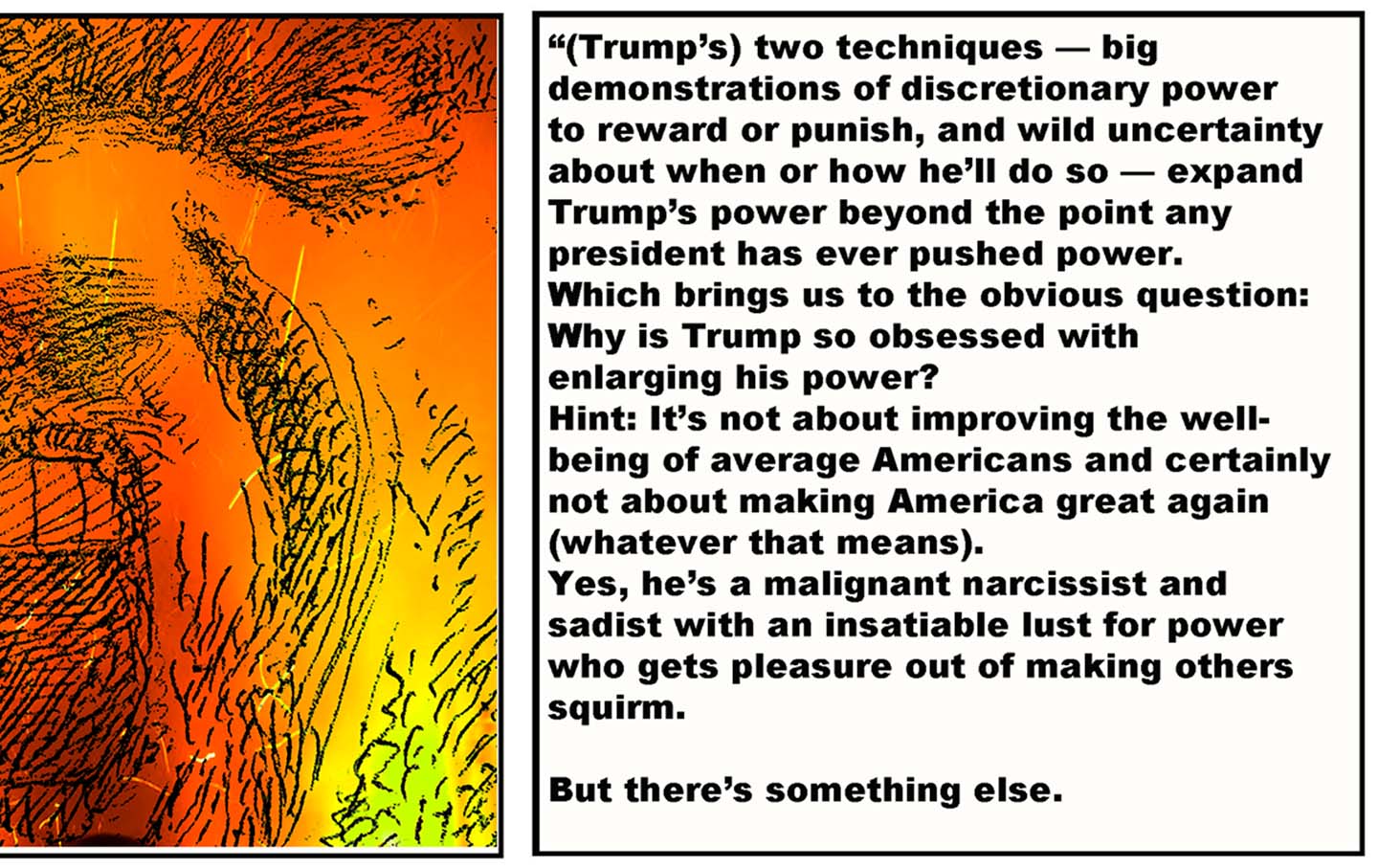Bitcoin Goes All In With Trump
With 10 senators and Trump in attendance at the national Bitcoin conference, the crypto currency moves from the fringes to the center of political life.
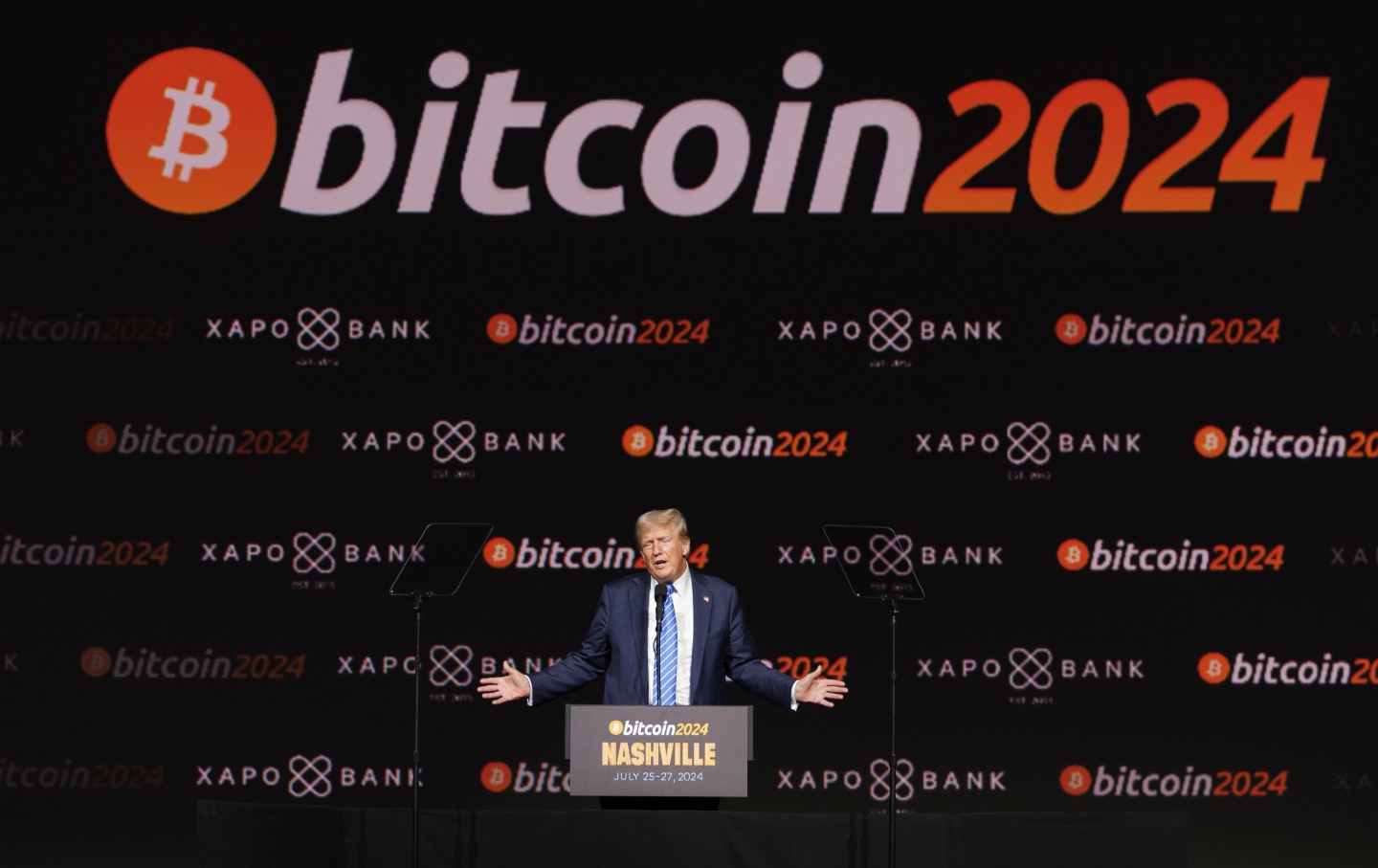
Former president Donald Trump speaks at the Bitcoin 2024 conference in Nashville, Tennessee, on Saturday, July 27, 2024.
(Brett Carlsen / Bloomberg via Getty Images)
Nashville, Tenn.—“If you don’t elect me,” Donald Trump told thousands of Bitcoiners at the annual Bitcoin conference on July 27, “I hate to tell you, you’re going to be crushed.”
The ex-president and newly minted crypto supporter spoke at the national Bitcoin conference for nearly an hour to a rapt audience, toggling between stroking attendees’ egos (“high-IQ individuals!”) and his own (“Because of me, [regulators] are leaving you alone. So please say, ‘Thank you, President Trump, thank you very much.’”) He hit his talking points (Bitcoin is a “miracle of humanity” that should not be stifled with regulation, and rampant inflation is a “stealth taxation” that is destroying the nation), and made election-year promises to unleash crypto’s profitability to even greater heights.
Five years ago, while Trump was in the White House, he had declared himself “not a fan” of Bitcoin and crypto, tweeting that they “are not money,” with their value “highly volatile and based on thin air.” But in the past few months, he has gotten cozy with the crypto industry, a process a Bloomberg report suggests was kicked off by Trump’s enchantment with his own NFT series—digital assets featuring flattering, iconized pictures of himself. But whatever precipitated the relationship, Trump has undoubtedly benefited from the industry’s ample spending money. The new pro-crypto super PAC Fairshake has thus far raised more than $200 million, which it has mostly spent on negative ads against Democrats. Trump reportedly amassed a full $21 million at the Bitcoin conference itself, mostly through a “roundtable” meeting whose entry fee was $844,600 a pop, with another $60,000 for a photo with the former president.
With Trump delivering a keynote speech to the conference, it seemed that Bitcoin had completed a journey from the economic fringes into the middle of political life. Another presidential hopeful, Robert Kennedy Jr., was also a headliner, and 10 senators were in attendance. “All of us were told we were crazy for years,” T.J. Miller, the conference MC of Saturday’s events yelled, as he paced across the stage. “And now, fuck those guys!”
Yet walking around at the Bitcoin conference gave a distinct picture of a crypto movement sitting awkwardly at a crossroads. The movement, on principle, rejects governments and banks but is also giddy at the arrival of politicians and BlackRock representatives. It fawns over well-heeled businessmen (as long as they’re pro-Bitcoin!) but is also brimming with libertarian nerds who arrived at the conference wearing as much orange (the color of Bitcoin’s logo) as they could find: from orange loafers up to their orange cowboy hats. One man wore a puffy physical representation of a Bitcoin on his torso, along with knee-high Elvis socks and a giant red hat that read “HAT GUY.” Another—a crypto influencer who excitedly told me, “They call me Loudmouth!”—was decked out in gold chains and rings, and had pictures of his own face, tongue out, embroidered onto his red-and-gold-sequined suit and sailor hat.
Hard to miss were the many men wearing “Vote Trump. Free Ross Day One” T-shirts, thousands of which were given away at the conference. Ross Ulbricht, now 40 years old, is serving a life sentence for founding Silk Road in 2011, a Bitcoin-fueled black market where people traded crypto for drugs, pornography, and occasionally—as Ulbricht himself did—assassination attempts. The majority-male and overwhelmingly white and middle-aged participants wore many hats: cowboy hats, baseball caps—many MAGA caps among them, but many more that read “Make Bitcoin Great Again.” At least a couple of men sported crumpled suits and Trump wigs.
At booths packed into the conference’s Expo Hall, one could buy packs of Bitcoin trading cards that teach kids “the fundamentals of sound money” or glow-in-the-dark “Essence of Bitcoin” art made by Jack and Susan, a couple who use 12,000 volts of electricity to burn what Susan explained were “lightening channels” in the shape of the Bitcoin logo and sparks into wooden wall art.
You could even purchase citizenship to Liberland, “the world’s freest country.” Colin, who showed me his own Liberland passport, explained that while he doesn’t live there himself, the territory was settled by about 30 people living in a house at the center of the island. The aspiring nation is being built on disputed territory between Serbia and Croatia. Liberland’s passports, Colin clarified, are “still not recognized,” so he uses his Canadian one to visit the island, where he must pass through a Croatian passport control. True to libertarian ideals, taxes in Liberland are voluntary and come with increased voting rights. “So you have to pay to vote?” I asked. Only to get extra votes, Colin explained, because every citizen earns voting rights by virtue of the $10,000 they’ve already paid to become citizens.
Some conference participants expressed mixed feelings about Donald Trump. Many preferred RFK Jr.—who has been around crypto for longer and whose libertarian leanings seem more aligned with Bitcoin’s ethos—but seemed willing to vote for Trump if it came down to it. Others said they’re not likely to vote at all and had only cast write-in ballots in the past. Some of Bitcoin’s more old-school adherents expressed ideological disagreements with the newly proclaimed “crypto president.”
Jimmy Song, an entrepreneur and writer, complained that Trump has an only superficial knowledge and was “LARPing as a Bitcoiner.” After all, Trump had created his own scammy NFTs (unpopular among Bitcoin’s hardcore) and uses the words “Bitcoin” and “crypto” interchangeably (also a no-no among Bitcoiners, who believe that only Bitcoin offers a real and decentralized alternative to fiat, state-backed currencies like the US dollar). Worse still, at the Republican National Convention, Trump took pains to go after Bitcoin’s biggest rockstar, the authoritarian president of El Salvador, Nayib Bukele, who made Bitcoin legal tender in 2021. “He did it to the wrong guy, right?” Song said to me. “Like, this is a guy who’s cleaning up the streets. And he’s got 90 percent approval rating in El Salvador. What? What are you doing?”
And on Friday, Edward Snowden, who spoke at the same conference hall via video projection, had warned attendees to “cast a vote but don’t join a cult.” He talked about the “dog-and-pony shows” being put on by politicians at the conference. Indeed, the very scripted discussion between Republican Senators Tim Scott and Cynthia Lummis seemed to fit the bill, with Scott proclaiming that under his party’s leadership, he would be appointed chair of the banking committee and Bitcoin will be “free at last, free at last, thank God almighty, free at last.” The crowd seemed pleased, except for one guy wearing a backward baseball cap that said “Wealth Mastery,” loudly booing from the side of the stage. For a moment I mistook him for an out-of-place liberal—until he yelled, “Is that why you voted for Biden?”
Yet by Saturday, when Trump was due to speak at the conference’s main Nakamoto Stage (named after Bitcoin’s pseudonymous founder, Satoshi Nakamoto), the hall was packed with thousands of amped-up attendees. Seats were scarce, but having gotten there six hours prior, I had snagged one close enough to the front that someone later offered me $150 for it. “You mean in fiat cash?” I clarified. “Yes,” he said, showing me the crisp bills in his wallet. Apparently, the dollar currency decried by Bitcoin believers is still good for something.
With an hours-long line to get into the main stage area (filing through three Secret Service screening lanes and magnetometers) and no guaranteed reentry, there was no sense in leaving the cold, dark hall once we were inside. Many people sat through the other talks that preceded Trump’s by trading crypto on their phones, or—in the case of the guy sitting next to me—reading the Bible while wearing sunglasses. There was no water or snacks available, except in a section marked off for “industry” or “whale” pass holders only—passes that cost $4,000 or $21,000 a piece respectively. As the Secret Service didn’t allow any bags to go into the room, most of us who had paid a mere $700 a ticket (or got a free press pass, thank goodness!) sat hungry while biding our time.
Trump began his list of promises to the Bitcoin community with a pledge to, “on day one,” fire Gary Gensler, current chair of the crypto-regulating Securities and Exchange Commission. He got a such vigorous applause—a standing ovation—that he continued: “I didn’t know he was that unpopular! Wow. Let me say it again. On day one, I will fire Gary Gensler,” to which the audience again erupted into thunderous applause and “Trump! Trump! Trump!” chants. The self-anointed “crypto president” also promised to commute the sentence of Ulbricht and declared that he would create a “strategic national Bitcoin stockpile,” with Bitcoin that has been seized by the Department of Justice. This move would ostensibly prop up the value of the digital token as well as grant it a level of governmental legitimacy—a curious wish for a movement that decries the role of government in monetary policy.
But in general, Trump kept his claims vague, complimentary, and grand. He promised to help Bitcoin “skyrocket like never before, even beyond your expectations,” and rolled digital currencies into his “America First” agenda. “Because if we don’t do it,” he warned, “China is going to be doing it, others are going to be doing it. Let’s do it and do it right. My vision is for an America that dominates the future,” prompting chants of “USA! USA!” from some of the people sitting next to me.
The United States, Trump promised, would become the “crypto capital of the planet and the Bitcoin superpower of the world.” He continued: “If crypto is going to define the future, I want it to be mined, minted, and made in the USA. It’s going to be! It’s not going to be made anywhere else.”
Never mind that the Chinese government has made the country one of the toughest jurisdictions for mining or trading cryptocurrencies. Never mind, too, that one of the primary promises of Bitcoin is to be borderless, maintained by an anonymous, international community. “And if Bitcoin is going to the moon,” he continued, referencing a popular crypto meme, “I want America to be the nation that leads the way. And that’s what’s going to happen.” Adopting a grandfatherly tone, he added, “Now you’re going to be very happy with me.”
The ex-president took credit for the increased savings that American families accumulated while he was in office thanks to Covid-era stimulus spending hated by conservatives and Bitcoin-loving libertarians, as well as the spectacular rise of the crypto bubble. “During my four years in office, Bitcoin surged by 3,900 percent, from $898 the day I took office to $35,900 the day I left.… Think of that. Now, compare that to just after 3.5 years of Biden and Harris adjusted for inflation. Bitcoin is up 50 percent. Now 50 percent sounds good, but not when you’re comparing it to almost 4,000 percent right?”
Solid math. But never mind the causes of crypto’s growth—first in 2017 through a scam-ridden boom of IPO-like “coin offerings” of knock-off digital tokens that Bitcoiners call “shitcoins,” and then in 2020 due to wild speculation fueled by the rock-bottom interest rates set by the Fed, policies denounced by many of Bitcoin’s true believers. Whatever the contradictions of Bitcoin’s explosive growth, neither surge had anything to do with Trump.

The crypto industry’s promoters have worked hard in the past few months to make crypto an election issue, and they have made significant headway. A few years ago, every actor, athlete, comedian, and superstar seemed to be touting Bitcoin and other cryptocurrencies. When the bubble burst, crimes and scams were exposed, culminating in the fraud-riddled implosion of the crypto exchange FTX in 2022, and the arrest of its founder, Sam Bankman-Fried. Public interest in crypto crashed alongside it, and to most people, even with the price of Bitcoin now back at an all-time high, Bitcoin, crypto, and NFTs still land somewhere between unintelligible and cringeworthy.
Popular
“swipe left below to view more authors”Swipe →Yet the industry has successfully pushed a false narrative to pundits and political consultants that millions of single-issue crypto voters could sway the upcoming elections. More importantly, it has shoveled tens of millions of dollars under the noses of candidates.
Although most of the politicians showing up at last week’s Bitcoin conference were libertarians and right-wing Republicans, a couple of Democrats also made an appearance. Representative Ro Khanna attempted to connect Bitcoin to progressivism, saying it’s “about freedom” and “empowering people.” He was greeted unenthusiastically but at least tolerated with scattered applause. Only Representative Wiley Nickel was nearly booed off the stage for criticizing Trump’s past disapproval of Bitcoin. “Wrong crowd!” someone yelled out. A collection of Democrats, including Khanna and Nickel, have since written a letter to the DNC calling for a “forward-looking approach” to digital assets. The Democrats’ presumptive nominee, Kamala Harris, has reportedly sought out meetings with crypto leaders to “reset” the industry’s relationship with the Democratic Party.
In reality, as crypto critic and researcher Molly White points out, the narrative that millions of crypto voters could swing the election relies on dubious data. The number of people owning crypto is likely vastly overestimated, and among those that say they care about crypto as an election issue, it’s unclear whether they want more or less of it.
In fact, the poll conducted and cited by the crypto industry itself points to a nearly opposite conclusion. Among the 1,201 voters polled, 60 percent agree that they’ve been let down by this economy, and 66 percent agree that the system lacks transparency. These kinds of statements—with which I also agree—ostensibly provide crypto’s raison d’être. But even greater numbers—73 percent, 74 percent, 71 percent respectively—disagree that “crypto is meant for people like me,” “crypto is more equitable,” or “it is easier for people to be financially successful with crypto.” The Digital Currency Group’s poll sums up a commonsense sentiment: The current financial system sucks, and crypto is worse. And whatever the industry’s anti-establishment pretenses had been, it has now lined up squarely behind the free-market, “America First,” policies of the right.
More from The Nation
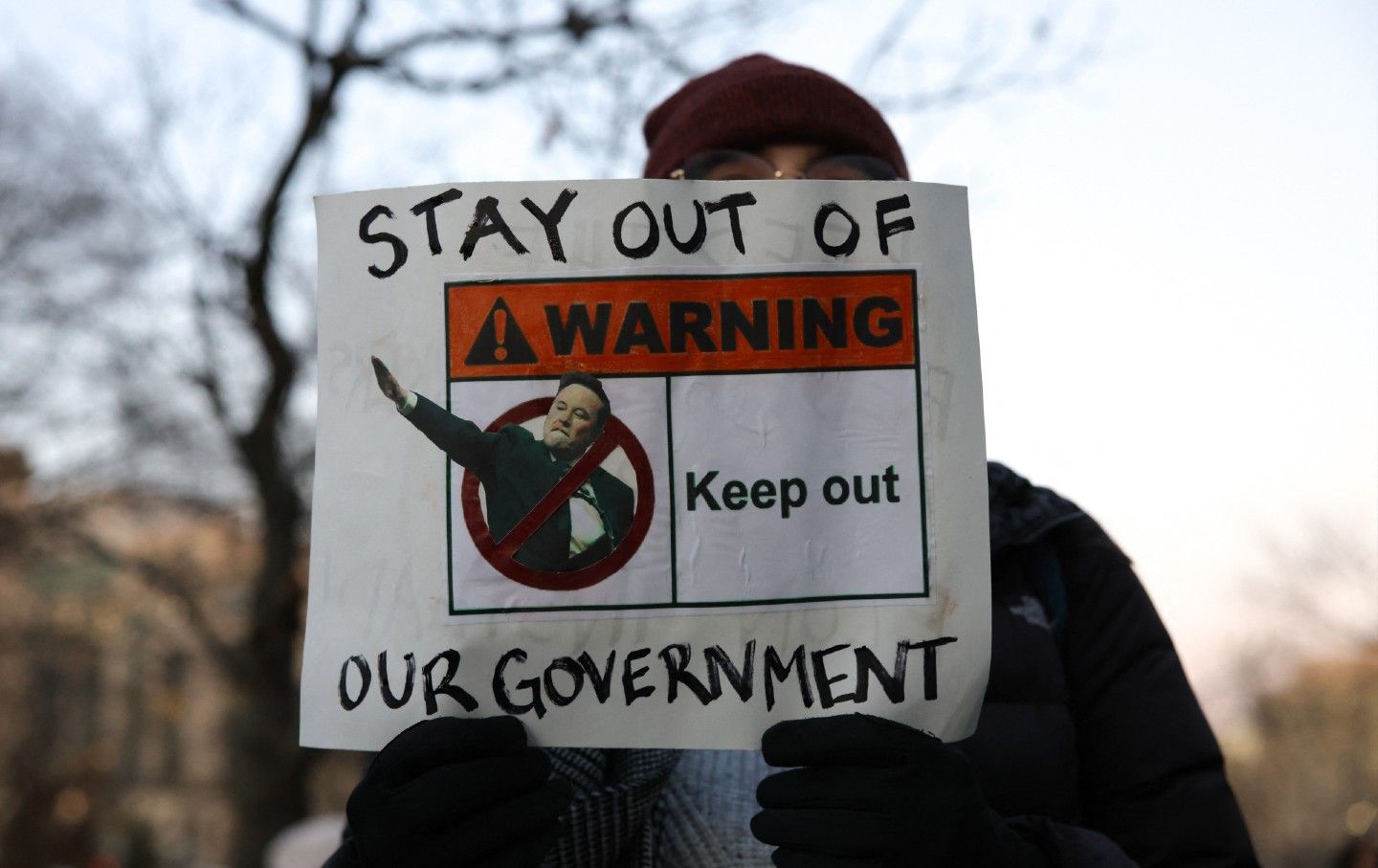
The Democrats’ Choice: Fight Trump’s Oligarchy or Keep Groveling to Billionaire Donors The Democrats’ Choice: Fight Trump’s Oligarchy or Keep Groveling to Billionaire Donors
Elon Musk’s power grab is finally energizing a resistance. But it’s already being undermined by the party elite’s dependency on Silicon Valley.

RFK Junior, Bad Bobby RFK Junior, Bad Bobby
A reminder of what was, and what is.
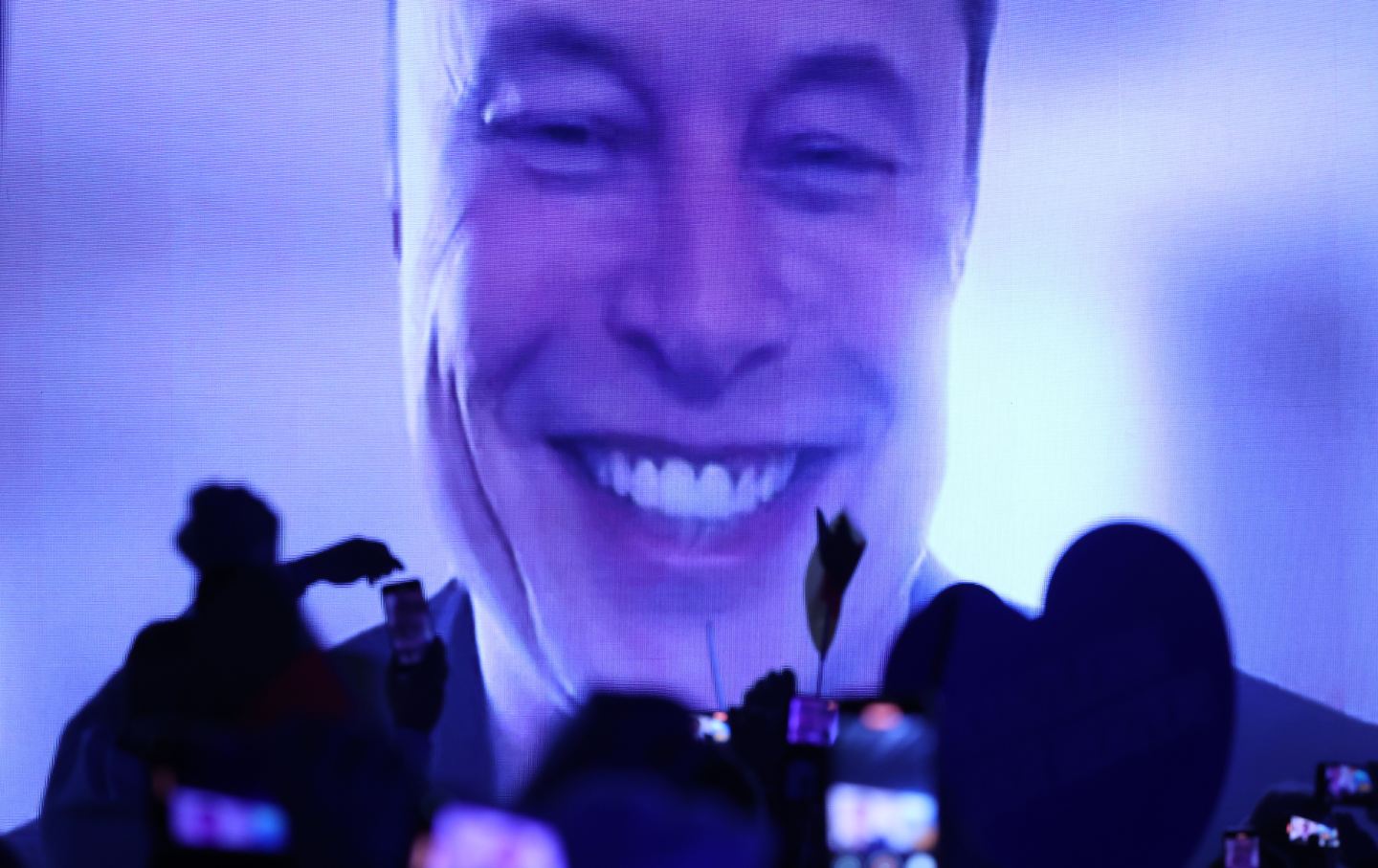
The Courts Can’t Stop the Trump-Musk Coup The Courts Can’t Stop the Trump-Musk Coup
While the lawsuits being filed against the Trump-Musk administration are righteous, they will not “save” us from this nightmare.

Immigrant Resilience Immigrant Resilience
Illegal raids at workplaces, schools, and churches are instilling fear in the most vulnerable communities, but immigrant resistance is growing stronger.
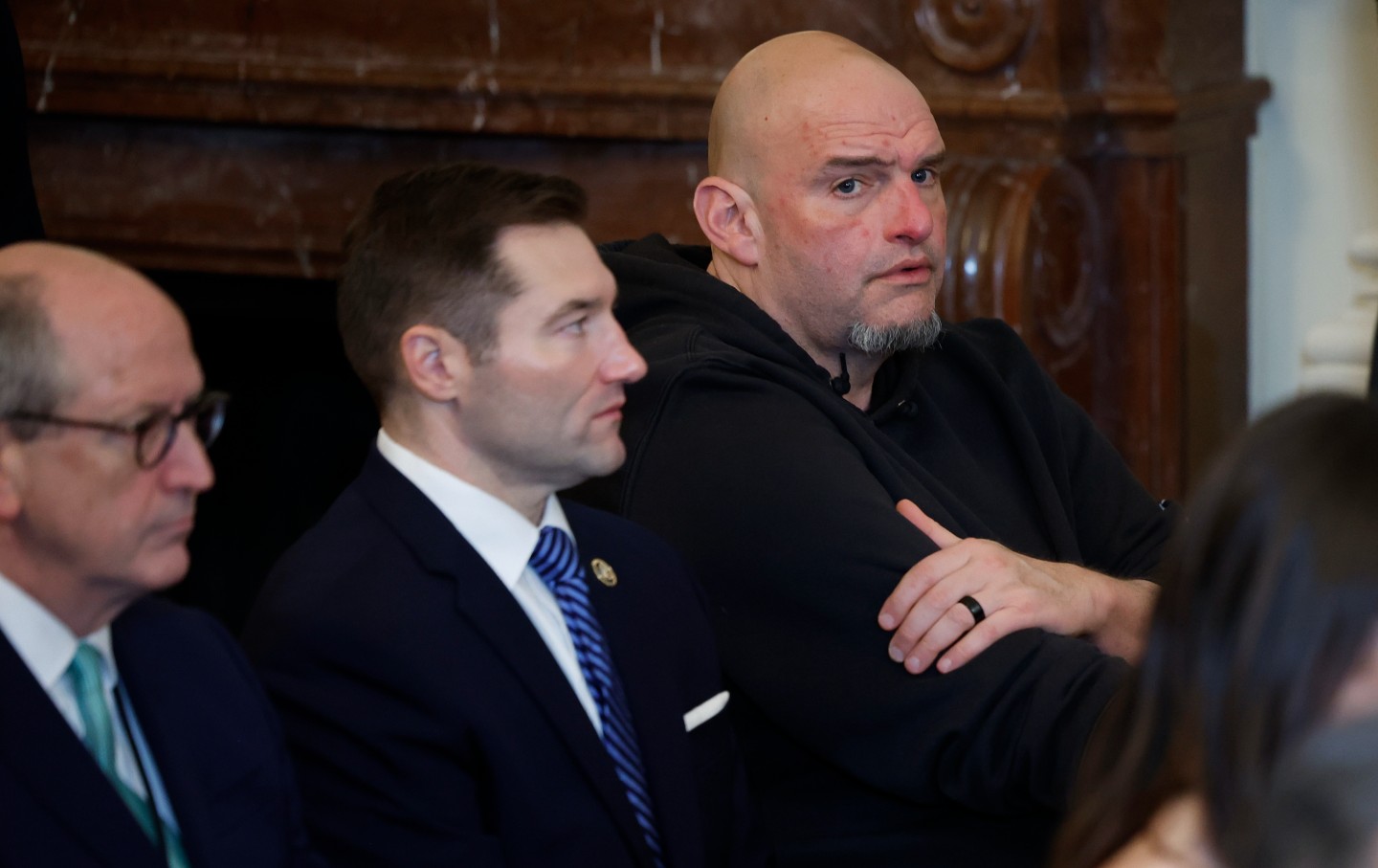
Democrats Are Helping Trump Carry Out His Nativist Agenda Democrats Are Helping Trump Carry Out His Nativist Agenda
Trump and his white-nationalist allies are pursuing a shock-and-awe strategy against immigrants—and many Democrats seem all too eager to join him.

